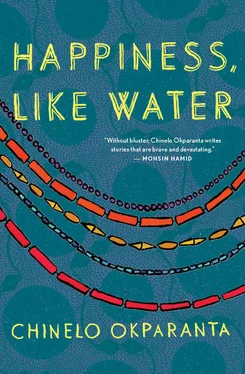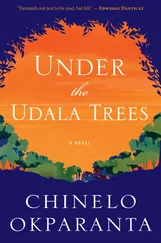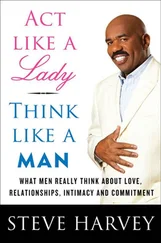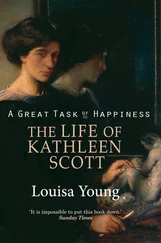That evening, Mama took me to the ice-cream shop in Brookline. One vanilla ice-cream cone for me. None for her. She held my hand and we walked together to the park. It was early summer, evening, but the sun was shining. The ice cream dripped down the sides of my cone.
We took turns teeter-tottering on the see-saw. We did not speak. She kept her eyes at a vanishing point behind me, far beyond where I sat on the see-saw, far beyond the trees, perhaps even as far as the horizon, where the sun hung like an orange ball in the sky. I observed her swollen lips, the side where Papa’s fist must have landed. Only when the sun began to set did she step off the see-saw. She came around to my side and held out her hand to me.
We had just turned the corner onto Buswell Street when we saw the woman. If it had been Sunday morning, before 9 a.m., she would have been inside the church, handing out cans of beans, boxes of Fruit Loops, loaves of bread.
But it was a weekday, not a day for the food bank. Perhaps she had just come out of one of those evening weekday masses, or perhaps she had just finished some other work at the church, because there she stood, a few steps in front of the church, waiting for the bus, the street lamp hanging above her, shining brightly over her head.
It was she who first waved to Mama, and of course, Mama waved back. And then she was signalling us with her hands to come over to her, and we did.
At first there was that smile on her face, but then her face turned serious, her mouth tightening into a circle. She stared at Mama’s lips, stared at mine as if expecting to find something similar to Mama’s. Her eyes were blue, and for a moment I thought of E.T. That deep blueness of his eyes.
‘What happened?’ she asked, her eyes narrowing with concern.
There were faint evening sounds — car engines passing by, birds and crickets singing in the dark. And suddenly Mama was crying, that serious kind of cry: her shoulders heaved, her breath caught. I leaned into her, held her hand even tighter than before.
Words came out of both of their mouths, Mama’s words hurried and inquiring and thick with her accent, the woman’s soothing and kind and flowing, the smooth way in which I had come to expect American speech to flow.
I thought of Papa in the apartment, wondered what would happen if he were suddenly to walk by and find Mama crying, if he were suddenly to walk by and find Mama telling the woman about the things he did to us. Surely he would lead her straight home and would let her have it again. Or maybe even, if he were furious enough, he would let her have it right there, in front of the woman. Not that he had ever done a thing like that in public before.
Still, a person did not go around with black eyes and swollen lips and such without people suspecting. The woman had surely seen it before — a black eye on Mama, or a purple-black bruise on my arm — as we stood in line collecting food from her.
Even at school, Mrs Stephens used to ask about the bruises. I’d tell her how I had fallen off the swing, or how I had accidentally caught my arms in the rope of the swing. Always the swing.
Mrs Stephens would nod at me suspiciously, and eventually I began to wear only long-sleeved shirts, and trousers, even when the weather became hot and muggy, even when the humidity made the fabric of my clothes cling to my skin.
We stood there. After a while, the woman looked into her handbag, pulled out a small card, wrote a number on it.
Mama wiped away her tears, accepted the card, nodded.
Soon the bus screeched to a stop, and the woman climbed inside.
We walked the rest of the way home, Mama and I, neither of us saying a word. Not a word as she quietly unlocked the door. Not a word as she quietly turned the knob. She knew Papa would be asleep by then. She did not want to wake him up.
She did not call. Not the next day. Not the day after. Weeks went by. A month. Two months. Each day that passed, I thought of the card, imagined it sinking lower and lower in Mama’s purse, imagined it arriving at the very bottom, disappearing there, among all her other outdated or unused notes — grocery lists and reminders — dog-eared, wrinkled and forgotten. Lurking in that abyss. Waiting to be gathered and thrown away.
Eventually, I stopped imagining the card.
Then one evening, we went again to the ice-cream shop, Mama and I. Papa had not yet returned home from the university.
We ate our ice-cream cones, teeter-tottered in the park, walked all around Brookline. When we got back home, Mama quietly unlocked the door, like the time before, quietly turned the knob. The lights flickered on just as she shut the door. It happened suddenly, Papa coming at us, dark and looming, like a shadow.
‘I get home and there’s no dinner,’ he shouted. ‘Now that you’re in America, you think you can behave like an American, staying out all hours of the night?’
Mama shook her head frantically, mumbled something about having lost track of time.
‘Lost track of time?’ he asked. His hand came down on her. Once. Twice. The third time, I got in the way, tried to stop him. His hand came down on me.
‘Is it the effect America is having on you?’ he shouted. ‘Did you ever lose track of time like this in Nigeria? No! All of a sudden you’re losing track! I’ll teach you a lesson on losing track of time. I’ll teach you both.’
More hands on us, pounding and pounding until we were down on our knees, crouched by the door, trying to catch our breath. Then the lights flickered off. We remained on the floor. We fell asleep there, Mama’s arms wrapped around me.
She must have called the next morning, after Papa left for the university, after I left for school.
Later, in the afternoon, I was sitting on the floor of my bedroom, sheets of homework scattered across the floor. Papa had not yet returned.
Mama said, ‘Hurry. We have an appointment to keep.’ I wondered what exactly the appointment was for.
We used to straighten our hair with those thick metal combs back then, the kind without electric cords, the kinds you stuck on top of one of the burners of a gas stove, on top of the blue-and-orange flames. You’d leave the comb sitting there on the fire while you parted the hair into sections. When you were done parting, and when the comb was nice and hot, steaming even, you’d pick it up, blow a little on it with your mouth, just to blow off a little of the steam. Then you’d stretch the hair with the comb, piece by piece, until there was not a single kinky curl left on the entire head.
I found her standing in front of the kitchen. I could see the stretching comb where it lay, on an open flame behind her.
‘Five minutes,’ she said. ‘Run into the bathroom, wash your face, brush your teeth, and change into one of your Sunday dresses, something nice.’
The dress I chose was my best one, the purple dress from the Salvation Army on Mass Ave, with the white polka dots and red ribbon in front. The seams were just starting to come apart at the sides, and under one arm a small hole had formed. No one could have seen the hole, so I put on the dress. And afterwards I went into the kitchen, where Mama was still standing by the stove, the stretching comb sticking out purposefully from her hand.
‘Mama, where are we going?’ I asked.
No response.
‘Mama, did you hear me?’
‘Turn your head this way.’
As soon as she finished with me, she put on her own dress. Not the adire wrappers she used to wear in Nigeria, no fancy headscarves like the ones she used to tie. Nothing special, just one of those long beige dresses, fraying at the hem, but still one of the nicer ones that she wore to church on Sundays. An American dress. It was the beginning of fall by now, but all around people were still wearing dresses.
Читать дальше












